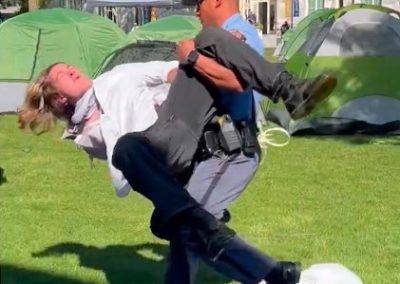Horror vacui (“Nature abhors a vacuum.”)
—Aristotle
When leadership fails to act on issues, either long term or short term, informal leaders can, and sometimes will, emerge and fill the void of leadership in an organization. This obviously can have a detrimental effect to the health and longevity of that organization.
Power in an organization can be classified as either formal or informal. Formal power is organizational power attained through promotion or appointed rank. Informal power is power one receives based on his or her following or informal influence they have throughout the organization.
Referent power is something like celebrity or popularity. Expert power comes from display of knowledge and capability. Any individual within the organization will have a track record of either or both referent and expert power (French and Raven, 1959).
In general, we train and stress leadership throughout the police organization. This is a good thing when the intentions are in the overall best interest of the that agency. For example, a supervisor in the field, having informal leaders on his or her team can aid in achieving the best overall outcome of calls for service, for the successful resolution of major tactical incidents, and for the development of newer officers.
Informal leaders, at times though, may not have the best interest of the organization in mind, and leaders in an organization must be cognizant of this. Informal leaders may not have an awareness of the police organization’s role in the overall city or county’s daily operation and future objectives. They may not have awareness of budgetary limitations or priorities. These and many more factors may negatively impact the agency’s reputation or image in the community and with city officials.
The leadership team is accountable, and should take responsibility, for the overall success of the organization. This includes but is not limited to being on top of crime trends and their respective solutions; financial and budgetary issues and restrictions; community relationships; and overall agency image and reputation.
Lead or Move Over
It is imperative that leaders in the organization lead. When the role of leadership is vacated or delegated there’s a risk of a lack of accountability of those responsible for the aforementioned measurements. That said, isn’t this the reason we promote to assume the responsibility and drive the organization to success? This doesn’t have to be a top-down “draconian” leadership style. But there exists a moral imperative that leaders who assume the mantle of leadership will—lead!
This can be accomplished by forming collaborative relationships with all employees to ensure a shared vision of the agency, in which ideals permeate throughout. Mission, Vision, and Value Statements should be collaborative documents that are created and understood by all employees in a police organization, not just mangers at executive levels.
Executive staff meetings should, first of all, be regularly scheduled, and the minutes from those meeting (with the exclusion of personal matters) shared with the organization. When there is an absence of information, conjecture, rumors and/or misinformation will fill the void and this will not be healthy for the organization.
The sergeants and middle-managers are crucial in the success of sending accurate information throughout the organization. In most organizations these folks have the most contact with “line-level” employees who carry out the various operational roles within the organization. Consistent and concise information on the direction the executive team is taking, and obviously soliciting feedback from this group, will ensure the members of the agency have a common operating perspective.
Conclusion
The executive team, and most notably the chief, will be held responsible for the success or failure of the agency. At the end of the day, those of us who have chosen to promote take on that burden of leadership. It makes sense to form collaborative relationships that assist in leading your organization to success. So lead!










0 Comments